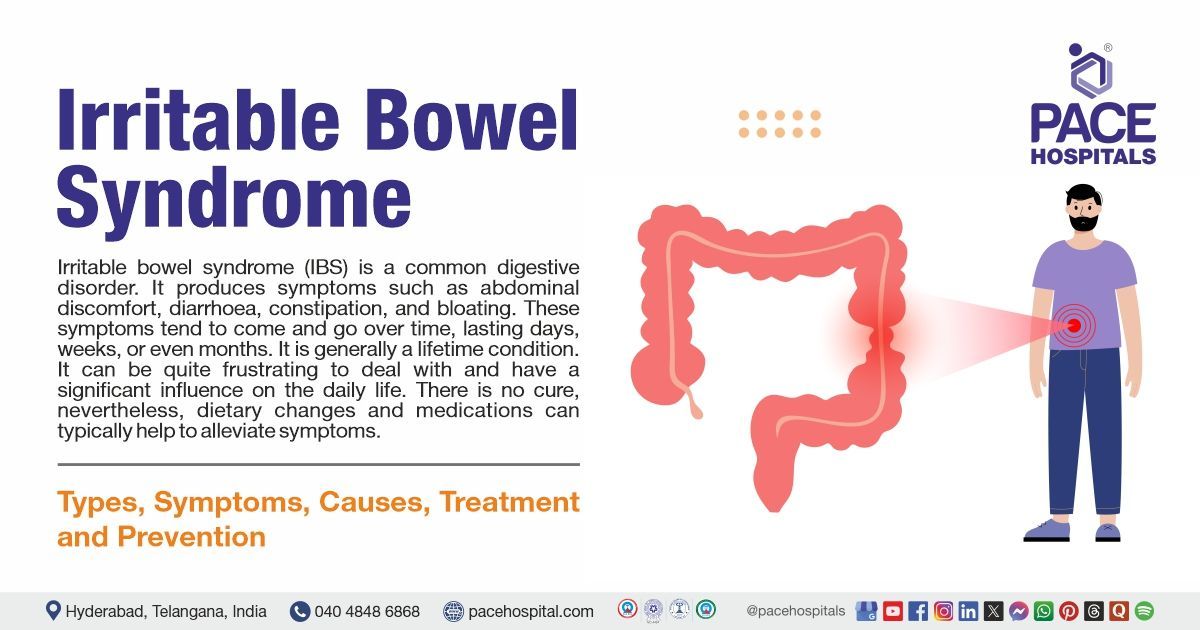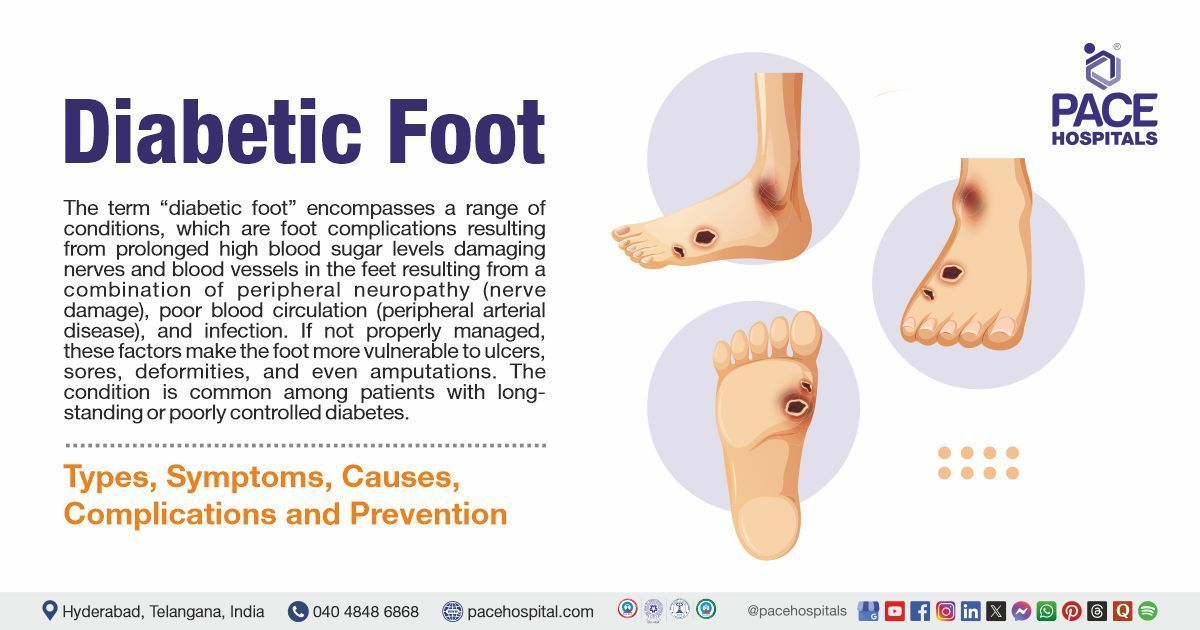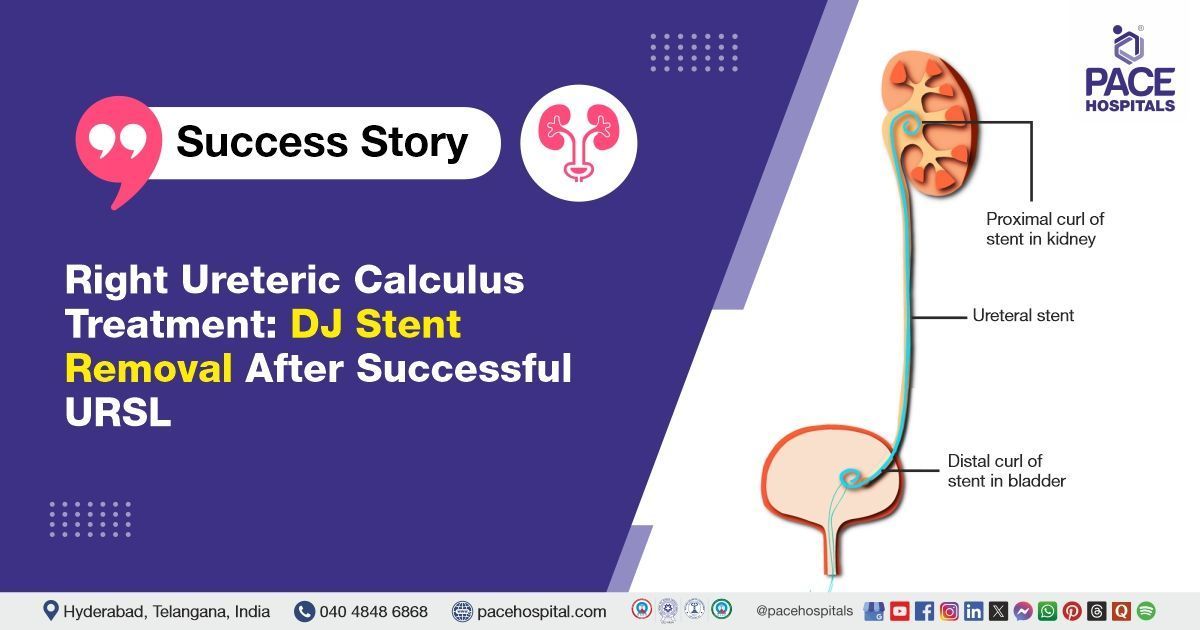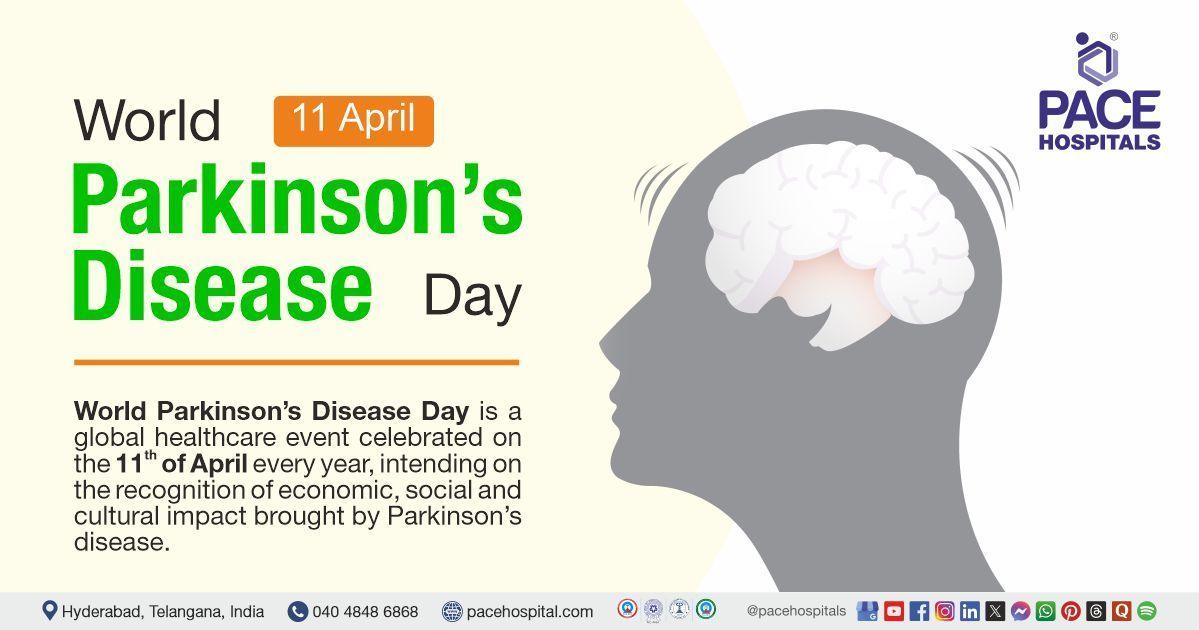Irritable Bowel Syndrome (IBS): Symptoms, Causes, Types, Diagnosis, Treatment, Prevention
What is irritable bowel syndrome?
Irritable bowel syndrome (IBS) is a common digestive disorder. It produces symptoms such as abdominal discomfort, diarrhea, constipation, and bloating. These symptoms tend to come and go over time, lasting days, weeks, or even months. It is generally a lifetime condition. It can be quite frustrating to deal with and have a significant influence on the daily life. There is no cure, however, dietary changes and medications can typically help to alleviate symptoms.
A comprehensive treatment strategy is necessary to manage this complicated gastrointestinal condition.
Gastroenterologists, dietitians, nutritionists, and mental health specialists are the healthcare experts who manage irritable bowel syndrome.
Irritable bowel syndrome meaning
The term "irritable bowel syndrome" comes from the concept of an "irritable bowel," which was first described by medical professionals like Walter C. Alvarez, where "irritable" refers to the abnormal muscle contractions and increased sensitivity of the intestines, causing discomfort and altered bowel movements characteristic of the condition; "syndrome" simply indicates a group of related symptoms.
Irritable bowel syndrome prevalence
Irritable bowel syndrome prevalence in world
According to most studies, the global prevalence of irritable bowel syndrome (IBS) is around 11% of the population, with variations depending on the diagnostic criteria used and geographic region, ranging from as low as 7% in South Asia to as high as 21% in South America; meaning roughly one out of every ten people worldwide may experience IBS symptoms.
Irritable bowel syndrome prevalence in India
According to research, the prevalence of irritable bowel syndrome (IBS) in the Indian community ranges between 10% and 20%.
Using the Rome III criteria, research conducted in a rural North Indian community demonstrated a prevalence of 4%.

Irritable bowel syndrome types
Irritable bowel syndrome (IBS) is divided into four categories depending on bowel movement patterns and abdominal discomfort:
- IBS-C: Irritable bowel syndrome characterized by constipation, with most feces being hard and lumpy
- IBS-D: Diarrhoea-predominant irritable bowel syndrome, with stools being loose and watery
- IBS-M: Mixed bowel habits irritable bowel syndrome is characterized by a combination of hard, lumpy, and loose, watery stool
- IBS-U: Undefined irritable bowel syndrome, where symptoms vary
Irritable bowel syndrome causes
Irritable Bowel Syndrome (IBS) is a complicated and multifactorial disorder, and understanding its origins is crucial for effective treatment. The specific cause of IBS is unknown, but a number of factors have been proposed as potential causes. Here are some important causes associated with irritable bowel syndrome:
- Altered gastrointestinal tract motility: Patients with irritable bowel syndrome (IBS) commonly have changes in bowel motility, which can lead to symptoms such as constipation or diarrhea. These changes may include increased or decreased contractions in the intestines, which affect the rate at which food passes through the digestive tract.
- Visceral hypersensitivity: Individuals with irritable bowel syndrome frequently exhibit heightened sensitivity to visceral stimuli, meaning they may experience pain or discomfort from normal digestive processes that others might not perceive as painful. This hypersensitivity is thought to be linked to changes in the nervous system's response to gut sensations.
- Post-infectious changes: A significant number of irritable bowel syndrome cases develop following gastrointestinal infections. Studies indicate that approximately 3% to 36% of individuals who experience an enteric infection may subsequently develop irritable bowel syndrome symptoms, particularly if the initial illness is prolonged or severe. This condition is called post-infectious irritable bowel syndrome (IBS-PI).
- Microbial imbalance (dysbiosis): Irritable bowel syndrome (IBS) is linked to changes in the composition of the gut microbiome. An imbalance in gut bacteria can affect gut function and produce symptoms through inflammation and changes in gut permeability.
- Psychosocial factors: Psychological stress and emotional factors play a crucial role in irritable bowel syndrome. Stress can exacerbate gastrointestinal symptoms, and patients often report a history of anxiety or depression. The interplay between psychological well-being and gut health is increasingly recognized as significant in irritable bowel syndrome management.
- Immune activation: Some people with irritable bowel syndrome have been found to have immune system dysregulation and low-grade inflammation. This immune response may cause symptoms of irritable bowel syndrome by causing altered gut function and increased sensitivity.
- Genetic and epigenetic factors: Genetic predisposition may cause irritable bowel syndrome, with family history playing a role. Epigenetic factors may also influence how individuals respond to environmental triggers that could lead to irritable bowel syndrome symptoms.
- Dietary triggers: Certain foods can worsen or trigger symptoms in individuals with irritable bowel syndrome. Common triggers include high-fat foods, dairy products, gluten, and certain fermentable carbohydrates (FODMAPs) that can lead to bloating and discomfort.
- Disrupted gut brain axis: Irritable bowel syndrome (IBS) is said to be caused by a disruption in the "brain-gut axis," a complex communication system between the brain and the gastrointestinal tract, where abnormal signaling between the two can lead to symptoms like abdominal pain, altered bowel habits, and bloating, with stress and emotions frequently playing a significant role in triggering these symptoms; essentially, the brain overreacts to normal gut signals, causing discomfort and altered gut function.
Irritable bowel syndrome symptoms
The most common symptom of irritable bowel syndrome is abdominal pain or discomfort caused by a change in bowel movements. Irritable bowel syndrome patients may experience abdominal discomfort in a number of ways, including severe pain, cramping, bloating, distention, fullness, and even burning.
Other signs and symptoms of irritable bowel syndrome may include:
- Presence of mucus in the feces
- Stool urgency
- Incomplete bowel movement
Patients with irritable bowel syndrome may also suffer from symptoms unrelated to the intestine, such as:
- Anxiety or depression
- Sleep disturbances
- Fibromyalgia (tenderness and widespread muscle pain)
- Chronic pelvic pain
- Migraine headaches
Certain individuals with irritable bowel syndrome are able to manage the symptoms and carry on with their daily activities. Some patients find that their symptoms prevent them from living a full life, including going to work or performing other crucial tasks.
Stress is frequently associated with the beginning of symptoms, which then improve as the stress is relieved. Other patients may experience irritable bowel syndrome episodes with no clear cause. Others may experience prolonged symptomatic periods followed by long symptom-free periods.
Irritable bowel syndrome symptoms in child
The most common symptoms in children with irritable bowel syndrome (IBS) are abdominal pain, which is frequently associated with bowel movements, and differences in bowel movements. Depending on the type of IBS a child has, these changes can include diarrhea, constipation, or both.
Symptoms of irritable bowel syndrome in men
The symptoms of irritable bowel syndrome in males are similar to irritable bowel syndrome symptoms in a female.
However, certain differences appear. For example, males are more likely than females to report diarrhea, whereas females are more likely to have constipation.

Irritable bowel syndrome risk factors
Irritable Bowel Syndrome (IBS) is a common gastrointestinal illness that drastically reduces people's quality of life. Biological, psychological, and social factors all play a role in its development. Understanding these factors can help in creating effective management techniques and enhancing the overall well-being of individuals affected by irritable bowel syndrome.
Common risk factors that can trigger irritable bowel syndrome include:
- Age: Irritable bowel syndrome is more common in young people, particularly those under 50 years old. The incidence decreases with age.
- Gender: Irritable bowel syndrome is much more prevalent among women than in men; research demonstrates that women are affected by the condition roughly twice as frequently as men.
- Mental health: Elevated levels of anxiety and depression are closely linked to irritable bowel syndrome. Individuals with these conditions are more likely to develop irritable bowel syndrome symptoms, while those who have irritable bowel syndrome may experience higher anxiety and depression.
- Psychological stress: Both psychological and physical stress have been linked to an increase in the incidence of irritable bowel syndrome. Individuals who have had substantial life stressors or traumatic events, particularly in childhood, are more vulnerable to develop irritable bowel syndrome.
- Family history: A family history of irritable bowel syndrome can raise an individual's risk, indicating a genetic or environmental component to the condition.
- Somatization and celiac disease: Somatization (the presentation of psychological distress as physical symptoms) and coeliac disease have been recognised as major risk factors for irritable bowel syndrome.
- Smoking and alcohol consumption: Current smoking and regular alcohol usage are linked to irritable bowel syndrome. These choices in lifestyle can worsen symptoms or accelerate the start of this condition.
- Dietary habits: Certain dietary factors may worsen irritable bowel syndrome symptoms, although the specific function of food allergies or intolerances is unknown. Dairy products, wheat, and high-fibre diets are among the most common triggers.
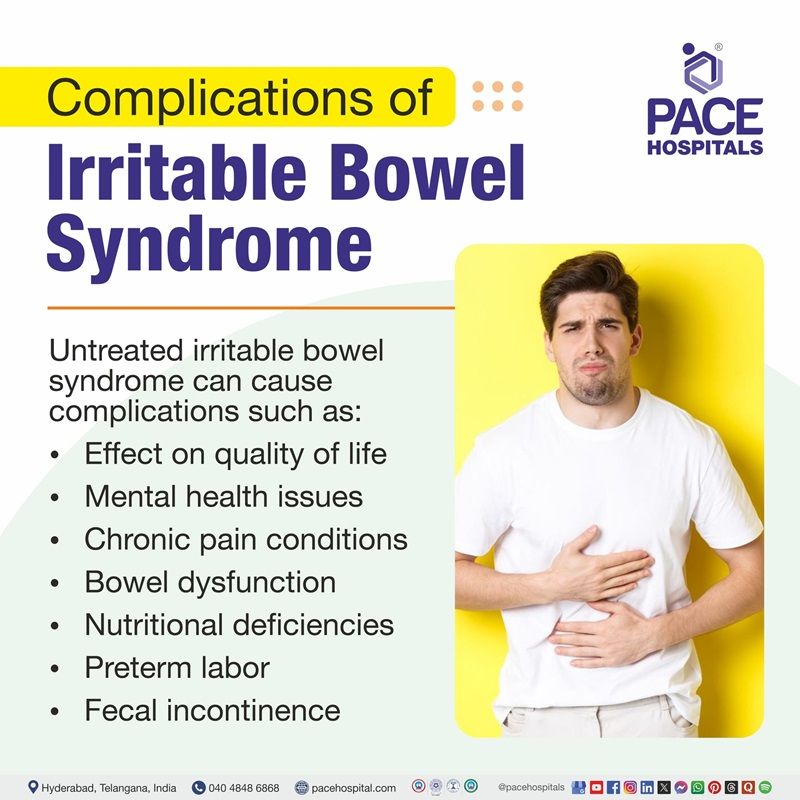
Irritable bowel syndrome complications
Irritable bowel syndrome is a persistent gastrointestinal condition that can significantly disrupt daily life. While the condition is most commonly associated with digestive symptoms, it can also cause a variety of other complications. Understanding these consequences is crucial for creating successful therapeutic plans and enhancing the overall well-being of the patient.
Untreated irritable bowel syndrome can cause complications such as:
- Effect on quality of life: Irritable bowel syndrome patients commonly experience a reduced quality of life due to chronic symptoms. Many people face increasing absences from work, which impacts their social and professional lives.
- Mental health issues: Research demonstrates that there is a strong link between irritable bowel syndrome and psychiatric disorders like anxiety and depression. The stress of managing chronic symptoms can aggravate these mental health concerns, producing a vicious cycle in which mental health problems increase irritable bowel syndrome symptoms and vice versa.
- Chronic pain conditions: Irritable bowel syndrome has been linked to fibromyalgia, chronic pelvic pain, and migraine headaches. This relationship can result in an overall increase in discomfort and reduced ability for affected people.
- Bowel dysfunction: Long-term constipation or diarrhea can lead to issues like hemorrhoids or anal fissures due to straining during bowel movements or frequent loose stools.
- Nutritional deficiencies: Some people may lose weight or develop deficiencies in nutrition because of dietary restrictions used to treat irritable bowel syndrome. If not treated properly, this could lead to illnesses like iron deficiency anemia.
- Preterm labor: During pregnancy, dehydration and irregular bowel contractions caused by irritable bowel syndrome might lead to preterm labor.
- Fecal incontinence: Fecal incontinence can be considered a complication of irritable bowel syndrome (IBS) because individuals with IBS, particularly those experiencing frequent diarrhea or urgency, have a significantly higher risk of experiencing accidental bowel leakage due to the disrupted bowel function associated with the condition; this complication can significantly impact quality of life for IBS patients.
Irritable bowel syndrome diagnosis
Irritable bowel syndrome is diagnosed through a systematic approach that includes taking medical history, physical examination, and specific diagnostic tests. Here are the important steps:
- Medical history
- Physical examination
- Application of diagnostic criteria
- Laboratory tests
- Additional testing
Medical history
The diagnosis starts with a detailed medical history where the healthcare provider assesses the patient's symptoms, including:
- Symptom characteristics: Frequency, duration, and nature of abdominal pain and changes in bowel habits (diarrhea, constipation, or alternating patterns).
- Red flags: Identification of any concerning symptoms that may suggest other conditions, such as unexplained weight loss, rectal bleeding, anemia, or symptoms that awaken the patient at night.
Physical examination
A comprehensive physical examination is conducted to evaluate the patient's overall health and to check for signs that might indicate other gastrointestinal disorders. This may include:
- Abdominal palpation
- Digital rectal examination
Application of diagnostic criteria
The Rome criteria are often utilized to aid in diagnosing IBS. According to these criteria, IBS can be diagnosed if the patient experiences abdominal pain at least one day per week over the last three months, associated with two or more of the following:
- Pain related to defecation
- Change in frequency of bowel movements
- Change in stool consistency
Laboratory tests
While there are no definitive laboratory tests for IBS, certain tests may be performed to rule out other conditions. Commonly suggested laboratory tests by a gastroenterologist include:
- Blood tests
- Stool tests
- Serologic tests
Additional testing
If red flags are present or if symptoms are atypical, further diagnostic procedures may be warranted:
- Colonoscopy or flexible sigmoidoscopy
- CT scan
- Hydrogen breath test
- Upper gastrointestinal endoscopy
Rome 4 criteria for irritable bowel syndrome
The Rome IV criteria system was created to diagnose functional gastrointestinal disorders (FGDs) according to their clinical symptoms. Because evidence of functional gastrointestinal disorders cannot be detected with traditional diagnostic tests, the Rome criteria are intended to assist healthcare experts in making the diagnosis of functional gastrointestinal disorders. The Rome criteria also allow for the implementation of standardized diagnostic criteria in research studies.
To be diagnosed with Irritable bowel syndrome (IBS), a person must have experienced recurrent stomach pain on average at least one day per week for the previous three months, with symptoms beginning at least six months prior. Pain must be associated with at least two of the following:
- Associated with defecation
- Correlated with a change in the frequency of bowel movements
- Correlated with a change in the stool's shape or appearance
Although the Rome IV criteria is strictly followed in research and clinical trials, in the real world, healthcare professionals frequently diagnose irritable bowel syndrome in anyone who has bowel symptoms but no visible inflammation or other signs of disease as revealed by standard digestive tests.
Irritable bowel syndrome treatment
The aim of irritable bowel syndrome therapy is to provide relief from symptoms. The course of treatment will depend on the type and severity of the clinical manifestations (symptoms).
Treatment of irritable bowel syndrome may include:
- Dietary changes
- Medications
- Smooth muscle relaxants
- Antidiarrheal medications
- Laxatives
- Antibiotics
- Low-dose antidepressants
- Psychotherapy
- Cognitive behavioral therapy (CBT)
- Gut-directed hypnotherapy
- Relaxation training
- Alternative therapies
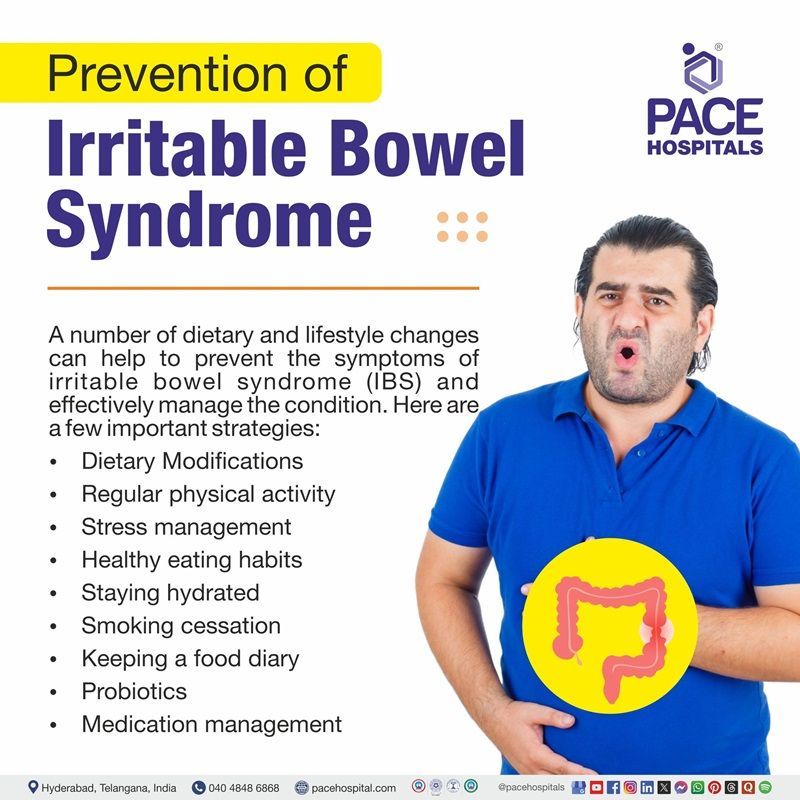
Irritable bowel syndrome prevention
A number of dietary and lifestyle changes can help to prevent the symptoms of irritable bowel syndrome (IBS) and effectively manage the condition. Here are a few important strategies:
- Dietary Modifications
- Avoiding foods that trigger irritable bowel syndrome: Identifying and avoiding foods that trigger irritable bowel syndrome may help prevent symptoms of irritable bowel syndrome. Common triggers include dairy, high-fat foods, processed foods, and certain fruits and vegetables like beans and broccoli.
- Increasing soluble fibre: Adding soluble fibre into the diet, such as oats and psyllium, which can help regulate bowel movements and alleviate constipation without worsening bloating.
- Limiting high-FODMAP foods: Following a low-FODMAP diet can help reduce symptoms by limiting fermentable carbohydrates that can cause gas and discomfort.
- Regular physical activity: Engaging in regular exercise has been shown to alleviate irritable bowel syndrome symptoms. Exercise can reduce stress and improve bowel function, which may exacerbate irritable bowel syndrome if neglected.
- Stress management: While stress does not cause irritable bowel syndrome, it can worsen symptoms. Techniques such as yoga, meditation, or relaxation exercises can help manage stress levels effectively.
- Healthy eating habits
- Eating smaller meals: Consuming multiple smaller meals instead of three large meals can help minimize bloating and discomfort.
- Chewing food thoroughly: Chewing food thoroughly and eating slowly can prevent swallowing excess air, reducing bloating.
- Staying hydrated: Drinking an adequate amount of water is crucial for digestive health. Adequate hydration helps prevent constipation and supports overall digestive function.
- Smoking cessation: Quitting smoking may help prevent the exacerbation of irritable bowel syndrome symptoms, as smoking has been linked to increased gastrointestinal issues.
- Keeping a food diary: Maintaining a diary of food intake and symptom occurrences can help identify personal triggers and patterns associated with irritable bowel syndrome flare-ups.
- Probiotics: Consider trying probiotics, which may help restore gut microbiota balance and alleviate some irritable bowel syndrome symptoms. Discuss with a healthcare provider which strains may be beneficial.
- Medication management: For those at higher risk or with existing symptoms, medications such as antispasmodics or laxatives may be prescribed by a healthcare expert to manage symptoms effectively.
Difference between Irritable bowel syndrome and inflammatory bowel disease
Irritable bowel syndrome vs inflammatory bowel disease
Irritable bowel syndrome (IBS) and inflammatory bowel disease (IBD) are two widespread gastrointestinal conditions that are easily confused due to their similar symptoms, such as stomach pain and bowel movement changes. While they may have some similar symptoms, the underlying causes, diagnostic criteria, and treatment choices for these conditions are different. Understanding the fundamental differences between IBS and IBD is crucial for accurate diagnosis and treatment. The table below outlines the basic differences between irritable bowel syndrome and inflammatory bowel disease:
| Aspect | Irritable bowel syndrome | Inflammatory bowel disease |
|---|---|---|
| Pathophysiology | Functional disorder without visible damage or inflammation. | Chronic inflammatory condition causing damage to the intestines. |
| Symptoms | Abdominal pain, bloating, and irregular bowel movements (diarrhoea, constipation, or alternating). | Chronic diarrhoea (often bloody), abdominal cramps, weight loss, fatigue, and systemic symptoms (fever, joint pain). |
| Causes | Likely related to gut motility issues, hypersensitivity, stress, and food triggers. | Immune system dysfunction leading to inflammation in the intestines, with genetic and environmental factors. |
| Diagnosis | Primarily symptom-based, using the Rome IV criteria. No visible intestinal damage or inflammation. | Diagnosis via imaging (colonoscopy, endoscopy), blood tests, and biopsy to detect inflammation and damage. |
| Treatment | Symptom management with dietary changes, stress management, and medications (e.g., fibre, antispasmodics). | Anti-inflammatory drugs, immunosuppressants, biologics, and in some cases, surgery to remove damaged sections of the intestine. |
| Risk of complications | No long-term damage or complications, but symptoms can severely impact quality of life. | Risk of serious complications, including strictures, perforations, fistulas, and an increased risk of colon cancer. |
Frequently Asked Questions (FAQs) on Irritable bowel syndrome (IBS)
How to cure irritable bowel syndrome?
Gastroenterologists might suggest dietary and lifestyle changes, as well as medications, probiotics, and mental health therapy, to manage irritable bowel syndrome (IBS). Patients may need to try several therapies to find what works best for them. A gastroenterologist can assist the patient in determining the most appropriate treatment approach.
What are the first signs of irritable bowel syndrome?
Irritable bowel syndrome (IBS) commonly begins with stomach pain or discomfort, followed by changes in bowel habits. Abdominal pain may feel like cramps, burning, bloating, or fullness. It can be caused due to consuming specific foods, emotional stress, or constipation or diarrhoea.
Is irritable bowel syndrome permanent?
Yes, irritable bowel syndrome (IBS) is usually a lifetime condition. However, symptoms might change over time and frequently improve with treatment.
Is irritable bowel syndrome dangerous?
Irritable bowel syndrome (IBS) is not considered dangerous because it does not cause permanent damage to the intestines, does not lead to serious diseases like cancer, or pose a life-threatening risk; however, it can be very uncomfortable and significantly impact quality of life due to its symptoms such as abdominal pain, bloating, diarrhoea, and constipation, which can be managed with dietary changes, lifestyle modifications, and medication when necessary.
Does irritable bowel syndrome go away?
No, irritable bowel syndrome (IBS) does not "go away" since there is currently no cure for it; it is considered a chronic condition that requires continuing management through lifestyle modifications, food adjustments, and sometimes medication to regulate symptoms, which can fluctuate over time depending on triggers.
What foods are good for irritable bowel syndrome?
Foods that are simple to digest, such as low-FODMAP options, can help with irritable bowel syndrome (IBS). These include lean meats (like chicken and fish), grains, oats, carrots, spinach, zucchini and bananas. Probiotics found in yogurt and kefir can also aid, while it is important to avoid high-fat, spicy, and gas-causing foods.
Which test used to find irritable bowel syndrome?
There is no specific test for irritable bowel syndrome (IBS). Gastroenterologists diagnose irritable bowel syndrome (IBS) by reviewing the patient's symptoms, medical and family history, and doing a physical examination. In some circumstances, gastroenterologists may prescribe additional testing to rule out other health problems.
Is ginger lemon tea good for irritable bowel syndrome?
Yes, Studies have shown that ginger successfully relieves gastrointestinal symptoms, has antiemetic and pain-relieving actions, and is one of the most frequently used herbal remedies by irritable bowel syndrome (IBS) patients.
Does irritable bowel syndrome cause anaemia?
Irritable bowel syndrome (IBS) does not directly cause anaemia. However, it can raise the chance of developing anaemia, particularly if people are unable to absorb enough iron from their diet.
A 2020 study found that people with IBS are more prone to follow restricted diets or avoid particular foods due to their symptoms. This can result in insufficient food intake, especially foods lacking in iron, which can lead to anaemia.
Irritable bowel syndrome (IBS), can strike anyone at any age, including those in their 60s, although its prevalence may be a little lower than that of younger people. It is true that irritable bowel syndrome is more likely to affect younger adults.
Yes, irritable bowel syndrome (IBS) can cause backache, with many people experiencing lower back pain as a symptom. This is often attributed to gas, bloating, or constipation, which can put pressure on the surrounding muscles and nerves, causing referred pain to the back. This is considered a common symptom among IBS patients.
Can irritable bowel syndrome cause weakness?
Yes, irritable bowel syndrome (IBS) can cause weakness, as fatigue is a common symptom experienced by many people with IBS, often described as feeling tired, lacking energy, and generally weak; this can be due to a combination of factors such as inadequate nutrient absorption, gut inflammation, and the psychological impact of irritable bowel syndrome symptoms.
Can hormone imbalance increase irritable bowel syndrome?
Yes. hormonal imbalances, particularly fluctuations in female sex hormones during the menstrual cycle or menopause, can significantly worsen irritable bowel syndrome (IBS) symptoms, indicating a strong link between hormone levels and irritable bowel syndrome manifestation. Many individuals with IBS report worsening symptoms during periods of hormonal change.
Can babies get irritable bowel syndrome?
Yes, kids and babies can get irritable bowel syndrome (IBS). Irritable bowel syndrome is a prevalent cause of stomach pain in children, with up to 5% of school-aged children affected.
Does irritable bowel syndrome cause weight loss?
No, Irritable Bowel Syndrome (IBS) does not typically cause direct weight loss; while some people with IBS may experience weight fluctuations due to dietary changes made to manage symptoms, unexplained weight loss is not a clinical manifestation of irritable bowel syndrome, and it may indicate a more serious underlying condition such as inflammatory bowel disease.
Can acid reflux cause irritable bowel syndrome?
While
gastro esophageal reflux disease (GERD) cannot directly "cause" IBS, there is a significant overlap between the two conditions, which means that many people with GERD also experience symptoms consistent with IBS, and studies show a high prevalence of IBS in individuals diagnosed with GERD. This overlap is likely due to shared underlying gastrointestinal dysfunction, and symptoms can sometimes be difficult to distinguish between the two conditions.
Request an appointment
Fill in the appointment form or call us instantly to book a confirmed appointment with our super specialist at 04048486868
Appointment request - health articles
Thank you for contacting us. We will get back to you as soon as possible. Kindly save these contact details in your contacts to receive calls and messages:-
Appointment Desk: 04048486868
Whatsapp: 8977889778
Regards,
Pace Hospitals
Hitech City and Madinaguda
Hyderabad, Telangana, India.
Oops, there was an error sending your message. Please try again later. We will get back to you as soon as possible. Kindly save these contact details in your contacts to receive calls and messages:-
Appointment Desk: 04048486868
Whatsapp: 8977889778
Regards,
Pace Hospitals
Hitech City and Madinaguda
Hyderabad, Telangana, India.
Our Locations – Find the Best Hospital Near You
Metro Pillar Number C1772, Beside Avasa Hotel, Hitech City Road, Near HITEC City Metro Station, Hyderabad, Telangana, India.
Mythri Nagar, Beside South India Shopping Mall, Hafeezpet, Madeenaguda, Hyderabad, Telangana, India.
040 4848 6868
Payment in advance for treatment at PACE Hospitals, Hyderabad, Telangana, India (Pay in INR ₹)
For Bank Transfer:-
- Bank Name: HDFC
Company Name: Pace Hospitals
A/c No.50200028705218
IFSC Code: HDFC0000545 - Bank Name: STATE BANK OF INDIA
Company Name: Pace Hospitals
A/c No.62206858997
IFSC Code: SBIN0020299
Scan QR Code by Any Payment App (GPay, Paytm, Phonepe, BHIM, Bank Apps, Amazon, Airtel, Truecaller, Idea, Whatsapp etc).

CONTACT US
Call: +914048486868
WhatsApp: +918977889778
Email: info@pacehospitals.in
FOLLOW US
SUBSCRIBE
Subscribe to our newsletter and stay updated with the latest health information.
Subscribe to PACE Hospitals' Public Newsletter
Thank you for subscribing to PACE Hospitals' Newsletter. Stay updated with the latest health information.
Oops, there was an error. Please try again submitting your details.
ABOUT US
QUICK LINKS
Disclaimer
General information on healthcare issues is made available by PACE Hospitals through this website (www.pacehospital.com), as well as its other websites and branded social media pages. The text, videos, illustrations, photographs, quoted information, and other materials found on these websites (here by collectively referred to as "Content") are offered for informational purposes only and is neither exhaustive nor complete. Prior to forming a decision in regard to your health, consult your doctor or any another healthcare professional. PACE Hospitals does not have an obligation to update or modify the "Content" or to explain or resolve any inconsistencies therein.
The "Content" from the website of PACE Hospitals or from its branded social media pages might include any adult explicit "Content" which is deemed exclusively medical or health-related and not otherwise. Publishing material or making references to specific sources, such as to any particular therapies, goods, drugs, practises, doctors, nurses, other healthcare professionals, diagnoses or procedures is done purely for informational purposes and does not reflect any endorsement by PACE Hospitals – your trusted hospital near me.

